Features Indicating Cult Activity at the Dipylon
https://doi.org/10.34780/y0ao-g26f
List of Contributors
- Klaus Müller [Chapter Author]
Synopsis
Original title: Befunde kultischer Nutzung am Dipylon
Abstract The spacious complex of the Dipylon gate formed the impressive backdrop of various public ceremonies in the area of the Dromos. Among the extant remains some constructed and ground features attest to cultic activity. For instance, post beddings in the gate courtyard indicate ephemeral structures which may have been connected with funeral ceremonies and the Panathenaea; a two-figure Aphrodite and Nymph group presumably stood in the well house; a Hellenistic altar of Zeus Herkaios, Hermes and Akamas stood in front of the gate’s city-side facade – a Themistoclean predecessor of this altar could be identifiable in a stone stetting. Furthermore an area paved with slabs in the centre of the Dipylon court and dating from the middle of the 3rd century BC may possibly mark the site of the altar of Demetrios Kataibates, attested in literary sources, and in front of the landward facade a large marble substructure indicates a Hadrianic (pillar?) monument.
Keywords City fortifications of Athens, ephemeral structures, circular altar, Demetrios Poliorketes, Hadrianic pillar monument




